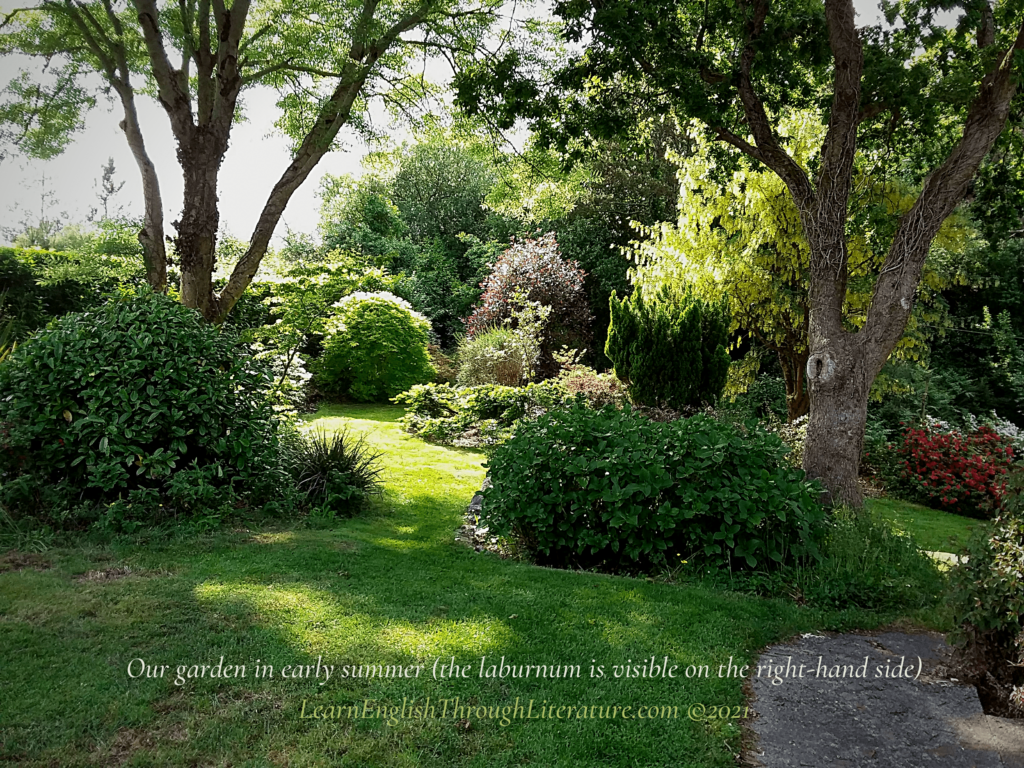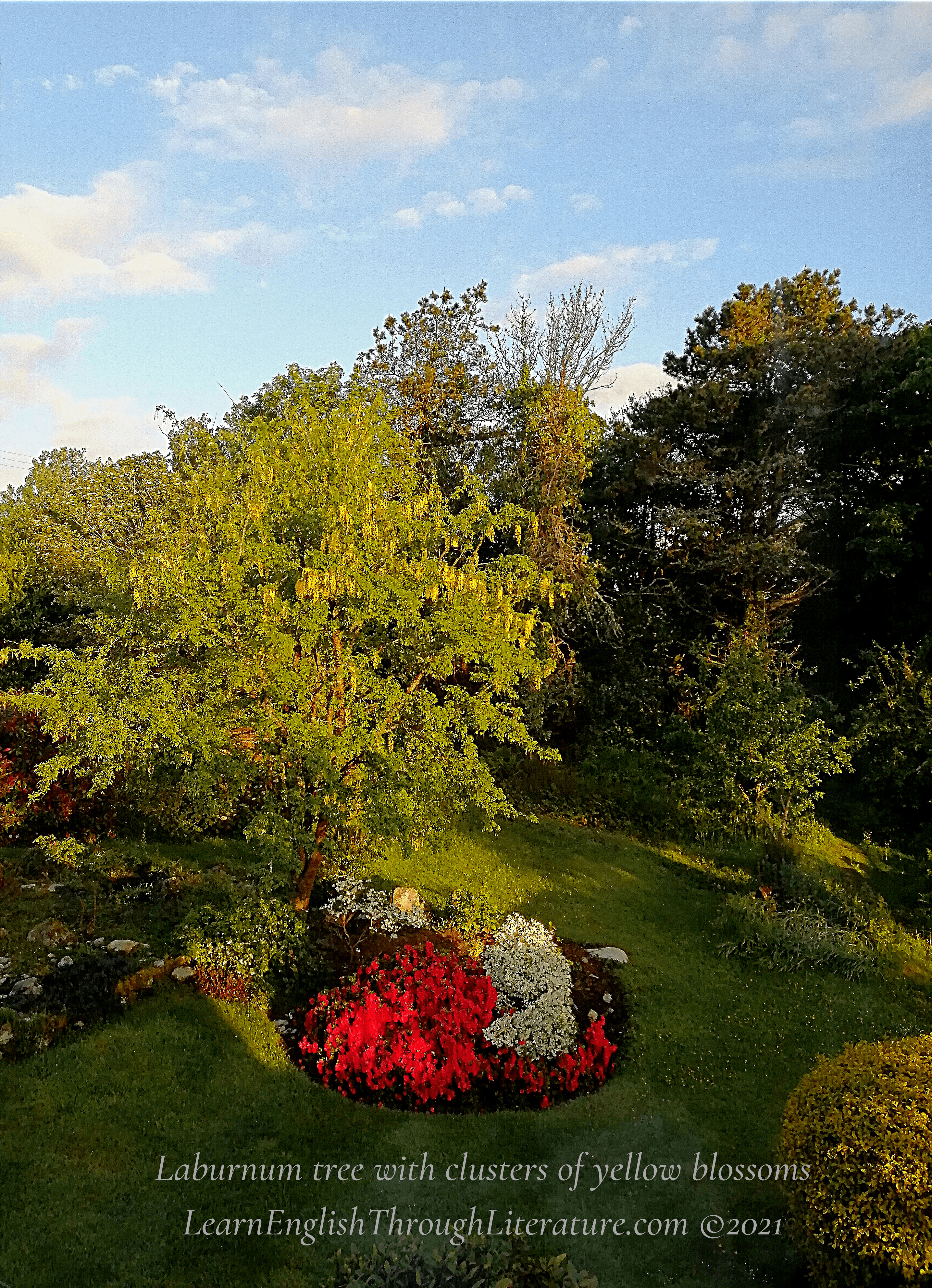One of the nicest aspects of preparing these Lessons is that I am always on the look-out for inspiration. In the last few days, I noticed how beautiful the laburnum’s flowers in our garden looked – the laburnum being a tree with drooping branches and yellow blossoms (flowers) that flower in May and June every year. 🏵️
Looking at the laburnum brought to mind a poem that my father used to recite to us when we were children, ‘I Remember, I Remember’ by Thomas Hood (1799-1845). He was an excellent poet and author who struggled with ill health for most of his adult life and spent the last period of his life confined (limited) to his bed.
In 1844, the year before he died, he wrote this well-known poem that has been studied by many school children in Britain and Ireland, ‘I Remember, I Remember’.
📜 It is well-loved for featuring the theme of childhood memories.
The poet speaks of his early sense of wonder and joy, which he feels he has lost in adulthood. It is also a reflection on loss and the fleeting nature of time. By contrast, in his childhood he was able to enjoy the wonders of nature in complete freedom.
The poet chooses his memories as the path to revive (make alive again) some of the early joys of his childhood. And these memories form the poem’s stanzas below.
If you have been following my Lessons for a while, you will remember that on Saturdays twice monthly we look at a classic poem in English. As always, I include the poem in full, as well as a vocabulary list and some reflections to help you better appreciate the poet’s work. Enjoy! 🌼
…
📝 ‘I REMEMBER, I REMEMBER’ (1844) BY THOMAS HOOD
I remember, I remember,
The house where I was born,
The little window where the sun
Came peeping in at morn;
He never came a wink too soon,
Nor brought too long a day,
But now, I often wish the night
Had borne my breath away!
I remember, I remember,
The roses, red and white,
The violets, and the lily-cups,
Those flowers made of light!
The lilacs where the robin built,
And where my brother set
The laburnum on his birthday,—
The tree is living yet!
I remember, I remember,
Where I was used to swing,
And thought the air must rush as fresh
To swallows on the wing;
My spirit flew in feathers then,
That is so heavy now,
And summer pools could hardly cool
The fever on my brow!
I remember, I remember,
The fir trees dark and high;
I used to think their slender tops
Were close against the sky:
It was a childish ignorance,
But now ’tis little joy
To know I’m farther off from heav’n
Than when I was a boy.
…
📝 NOTES ON STANZA 1
✏️ VOCABULARY:
peeping: from verb to peep: to look quickly at something, often through a narrow opening
morn: [literary] morning
wink: to close and open one eye quickly, usually to show that something is a joke, secret, or as a sign of affection or greeting
borne: past participle of the verb to bear: carry or transport [something] away
breath: the air taken into or exhaled from the lungs. [In this context] spirit, life
..
In these beautiful opening lines, Hood begins by describing the sun as if it were a person (this representation is called personification) who can peep through the window into his room every morning.
As a child, every day felt like it was the perfect length, neither too short nor too long. When he speaks of how ‘now, I often wish the night / Had borne my breath away’, he is saying that he wishes he could have passed away in his childhood so that he wouldn’t have experienced the pain of facing life as an adult.
💡 NOTE: You will see how the third line of this stanza does not end with a comma, which means that when you are reading it aloud you should not pause at the end of the line that has no comma but in fact should continue reading without interruption into line 4. It should read (and sound) like this: ‘The little window where the sun came peeping in at morn.’
✍️ Poets often make use of this punctuation (or lack of it) to create a more conversational style. It certainly works well in this poem, the whole of which reads like thoughtful storytelling.
…
📝 NOTES ON STANZA 2
✏️ VOCABULARY:
violet: (noun) a small, low-lying flower that has purple, blue, or white flowers; (adjective) the light bluish-purple colour associated with such flowers
lilac: (noun) a shrub of the olive tree family, which has fragrant violet, pink, or white blossoms; (adjective) a pale pinkish-violet colour
robin: a brown garden bird with a red chest, commonly seen in British and Irish gardens
laburnum: a tree that has hanging clusters of yellow flowers and poisonous seeds. Its timber is sometimes used as an ebony substitute
yet: still
..
The next stanza is full of references to flowers and different colours. In fact, several of the flowers – lilacs, roses, and violets – have given their names to colours in the English language. 🌷
The laburnum is a tree with drooping branches and bright yellow flowers that blossom in May and June (you can see ours in the feature images above and below). Like Hood’s laburnum tree, ours is also over 30 years old and ‘is living yet!’ 🏵️
He describes how very beautiful the flowers were in his childhood garden. But he also mentions to us that they seemed to have a very special glow for him when he was young, a kind of beauty that filled him with wonder at the time.
💡 The exclamation mark (at the end of this stanza) impresses us with a feeling of relief – the poet has suddenly realised he is still connected to the past through the beautiful laburnum tree which his brother planted on his birthday.

…
📝 NOTES ON STANZA 3
✏️ VOCABULARY:
to swing: to sit and rock energetically back and forth on a seat that is suspended from a tree, frame, etc.
swallows: birds with distinctive forked tails that migrate from Africa to northern Europe in the summer
on the wing: [describing birds] in flight; flying
fever: the state of having a high temperature (being abnormally hot) as a symptom of an illness
brow: 1) forehead; 2) the highest point of a hill
..
In the third stanza we see how the poet used to daydream (think pleasant and wishful thoughts while awake) that the wind was brushing past him in the same way as it rushes past swallows (birds) as they fly. In other words, he used to imagine that feeling the wind on his face while swinging was just like being a swallow and flying through the air! 🕊️
He was light-hearted and free then, with his soul or ‘spirit’ feeling like a bird that ‘flew in feathers then’ without the burdens or cares of adulthood, which weigh it down ‘so heavy now’. He recalls (remembers) how he used to be so full of excitement with ‘the fever on my brow’. A fever is normally a negative symptom of an illness, but here it is used to describe his nervous and happy excitement that he felt when playing outdoors near ‘the summer pools …’
…
📝 NOTES ON STANZA 4
VOCABULARY:
fir trees: evergreen trees with cones and flat needle-shaped leaves. Traditionally cut and decorated as Christmas trees.
slender: narrow and gracefully thin; very slight
childish vs childlike: ‘childish’ means immature, silly, foolish. By contrast ‘childlike’ tends to mean something more positive: trusting, innocent, tender-hearted.
ignorance: regrettable lack of knowledge
farther: further; more far than [something]
..
As a child, Thomas Hood used to imagine that the tops of the fir trees were able to touch the sky itself (you will notice how he uses ‘sky’ and ‘heaven’ interchangeably here, something that is commonly found in more old-fashioned English).
He speaks of ‘childish ignorance’, which in turn causes us to think about its opposite: adult knowledge. ‘But’, as he says, emphasising a contrast, ‘but’ this mature knowledge and understanding does not give him much joy (‘little joy’) now that he knows the truth. He is pained to think that as an ignorant, or innocent, child he felt closer to heaven and God than he does now. He bemoans (grieves) for what feel like the lost blessings and happiness of being a hopeful child. ✨
The way stanza 4 is written (especially its last four lines) actually indicates the opposite in a complicated way. He writes of ‘little joy’ when he means ‘unhappiness’, and ‘I’m farther off from heav’n / Than when I was a boy’ means ‘I feel I was closer to heaven when I was a boy than I am now’. These inversions (reversal, reverse) between what is literally written and what he meant when he wrote it is actually a fairly common practice in English, where speakers and writers often speak in the negative about what they positively want (‘How are you?’ ‘Oh, I am not too bad’ meaning ‘I am well’, etc). In Hood’s poem, the slight inversion here highlights the differences between what he wishes were still true and the actual change brought by time and experience.
…
📜 This gentle, thoughtful poem is one that most readers can relate to on one level. If you had a fairly happy childhood, you probably have good memories of it; sometimes those memories stir longings (deep, lasting desires) to meet people you once knew or visit places you had once lived in.
So even if you do not have a laburnum tree in your back garden to bring you memories of your childhood, this poem has probably reminded you of something significant in your past – a plant, a tree, anything pretty at all – that brings a smile to your face when you see it and remember. 💮




